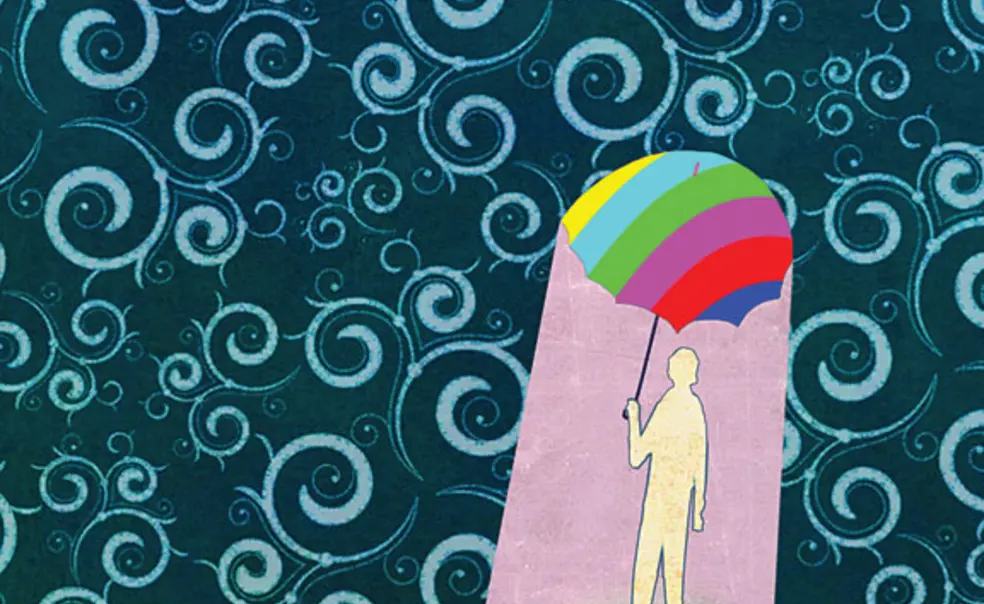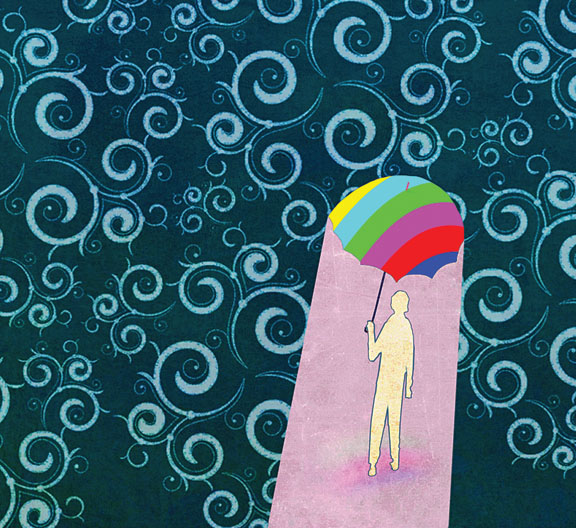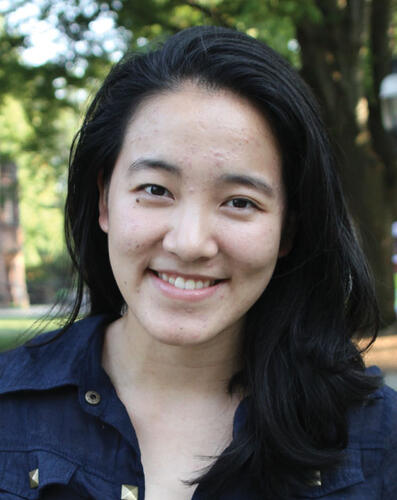Message of hope for bullied teens
“When I was in high school, the world was very small,” said Emily Rutherford ’12. “I thought I was the only person like me. I thought I was weird.”
Sitting on a rainbow blanket-covered couch in the LGBT Center’s student lounge, Rutherford spoke directly to a video camera operated by Jacqueline “Jack” Thornton ’13.
“You’ll find out so soon that there are more things out there,” Rutherford said. “And for me, that’s why life does eventually get better.”
It was a Tuesday night at the end of October and the two were filming a video for the It Gets Better Project, a nationwide effort to reach out to lesbian, gay, bisexual, and transgender youth who feel isolated or suicidal. The project was started in response to media accounts of several cases in which gay teens had taken their own lives after being bullied.
Thousands of individuals and organizations, including President Obama, Ellen DeGeneres, and Google, have contributed videos encouraging struggling teens to see the long view — that they can overcome bullying and live happy, fulfilled lives.
“LGBT kids need to be able to see themselves as happy in the future,” Thornton said. “They need to be able to visualize a place where it actually can get better.”
For many, that place is Princeton. “I think Princeton is a safer and more welcoming place to be than a lot of other universities,” Rutherford said.
But the campus still has room for improvement, students say. According to AllPrinceton.com, a community-based website, the LGBT Center receives an average of one or two reports of harassment over sexual orientation every month, though it’s believed that many incidents go unreported.
Members of Princeton’s LGBT community said that for them, life had improved since high school. In the video, seven undergraduate and graduate students share their messages of hope, as well as stories about everything from overcoming thoughts of suicide to finding a supportive group of friends.
For all of them, the issue is deeply personal.
“I was one of those kids who needed something to look forward to,” said Thornton, who comes from a conservative town near San Diego. She found it when she first met her Princeton alumni interviewer, a recent graduate who told her about how positive her own experience as a lesbian at Princeton had been.
“She was the first person that I came out to,” Thornton said during a break from filming. “She did for me what I hope this video will do for others.”
As Meredith Sadin GS finished her sequence for the video, Elizabeth Borges ’11, waiting for her turn, congratulated her: “Great job! That was really beautiful.”
Angela Wu '12 is a member of the University Press Club. Her work has appeared in Marie Claire, Teen Vogue, and other publications.














1 Response
Walter Weber ’81
10 Years AgoDon't bully ideas, either
The unspoken assumption of Angela Wu ’12’s Dec. 8 On the Campus article, “Message of hope for bullied teens,” is that of course there is nothing wrong or harmful with acting out LGBT lifestyles. This is the typical approach of mainstream media coverage of sexual-preference issues: By and large, anything goes, and anyone who disagrees is either a retrograde bigot, a religious nut, or both.
May I submit that such an unquestioned assumption does a disservice to the discussion, to those who hold contrary views, and even to those who claim LGBT identities?
First, shutting off opposing views implicitly, and dismissing such views without even acknowledging the possibility that adherence to millennia-old norms might be legitimate, even if not ultimately persuasive, is not an exercise in intellectual openness. It is rather a form of ideological shunning.
Second, calling one’s adversaries “haters” and “bigots” is not arguing, it is preempting arguments with epithets. While Ms. Wu thankfully did not indulge in such name-calling, I am afraid it too often characterizes what passes for public debate of sexual-orientation issues. It most certainly is wrong to bully others. Let us not forget that bullying can raise its ugly head in the realm of ideas as well.
Third, consider the highly politically incorrect possibility that there is such a thing as a harmful or unnatural sexual act. (Presumably all but the most extreme sexual libertine will admit this, at least secretly.) Is it a benefit to one possessing the desire to act categorically to eliminate all voices that might suggest restraint? Is it not rather a species of “informed consent” to at least mention that there are counterarguments?